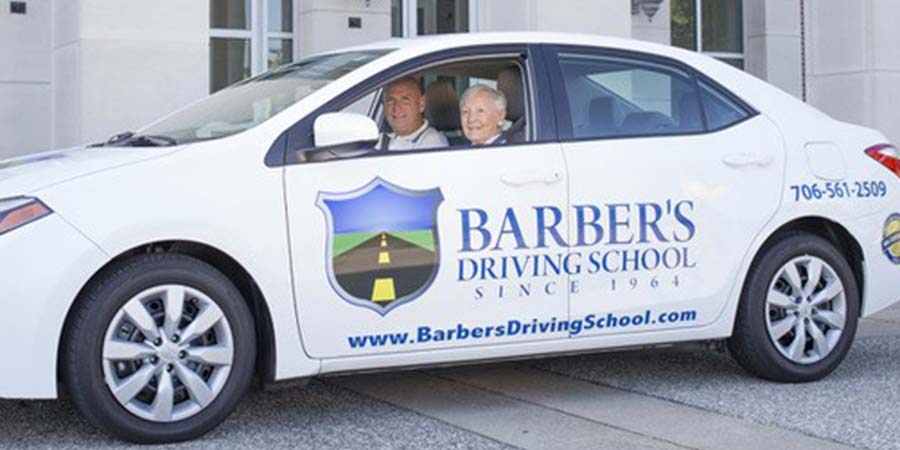by Cara Harman and Dustin Abram
Driving, classified as an Instrumental Activity of Daily Living (IADL), holds a unique status as one of the most hazardous and complex routine tasks that individuals undertake regularly. While therapists play a crucial role in assisting people with other activities of daily living, there is a conspicuous shortage of support for a question that often looms large after illness or injury: “When can I drive?” Driving is an activity that demands the harmonious interplay of various sensory, motor, and cognitive functions. A comprehensive driving evaluation can pinpoint and address any potential shortcomings, thereby enhancing overall road safety.
Regrettably, the accessibility of these invaluable evaluations is limited by substantial barriers. Fear is often one of these barriers, exemplified by patients’ apprehension about losing their drivers license and testing anxiety. Additionally, healthcare providers often lack awareness of the benefits offered by driving rehabilitation programs and face challenges in acquiring the necessary training. Long wait times for evaluations, absence of local programs, assessments conducted in unfamiliar settings, and cost-related issues further compound the difficulties.
While insurance providers may not designate driving as a “medical necessity,” clinicians possess the capacity to make a valuable contribution in this regard. Clinical driver evaluations, when conducted by OTs/PTs, are covered by most insurance policies, effectively halving the cost for patients. (However, the behind-the-wheel test, comprising the second half of a comprehensive driving evaluation, isn’t covered by any medical insurance.) In practical terms, trained generalist OTs/PTs can conduct these evaluations in outpatient settings with minimal equipment and subsequently refer patients for the on-road or behind-the-wheel evaluation.
Tier 1 referrals, dealing with clients who require no specialized equipment and typically involve cognitive deficits, can be directed to trained and licensed driving schools or driver rehab specialists, who may have shorter waiting times. Tier 2 and 3 referrals, addressing the needs of patients who require adaptive equipment and/or car modifications (e.g., spinal cord injuries, right hemiplegia, amputations), are appropriately directed to Certified Driver Rehabilitation Specialists (CDRS) who can evaluate all 3 tiers. This coordinated approach ensures tailored care for individuals with diverse needs, while optimizing insurance coverage and shorter wait times, for the overall evaluation process.
Recognizing this challenge, the CODE-CCDE program model emerges as a pioneering solution, employing a distinctive collaborative approach within the spectrum of driver services. The spectrum itself is a product of joint efforts by the Association for Driver Rehabilitation Specialists and AOTA, establishing a standardized framework for language and models in driving programs. At the heart of the CODE-CCDE model lies a commitment to excellence through continuous training and support for participating providers, predominantly occupational or physical therapists. This ensures that clinical driving evaluations are not merely competent but strive for superiority, adhering rigorously to established best-practice guidelines.
A CODE-CCDE team—composed of occupational therapists, Certified Driver Rehabilitation Specialists (CDRS), seasoned state third-party examiners, and behind-the-wheel instructors—has developed a 10-hour evidence-based course for clinicians. This program is meticulously crafted to empower generalist OTs and PTs with the essential skills required to proficiently carry out the initial phase of a comprehensive clinical driving evaluation. The objective is to enable these professionals to seamlessly conduct assessments and make informed referrals for the subsequent behind-the-wheel assessment.

CODE-CCDE 10-Hour CEU Course
After completion of the CODE-CCDE course, participants should be able to:
- Apply knowledge of medical conditions with implications to driving
- Assess the cognitive, visual, perceptual, behavioral, and physical limitations that may impact driving performance
- Integrate the clinical findings with assessment of on-road performance
- Synthesize client and caregiver needs and assist in decisions about available options
- Coordinate with multidisciplinary providers to provide resources related to the needs of clients
What does the course entail?
The course guides clinicians through the steps of a comprehensive clinical driver evaluation for tier 1 patients, i.e., patients who do not require adaptive equipment. Specifically, the modules provide information on cognitive, visual, perceptual, behavioral, and physical limitations that may impact driving performance. The course also focuses on evaluating common medical conditions that impact driving safety but do not require modifications to a vehicle, such as dementia, Alzheimer’s Disease, Parkinson’s Disease, and CVA. This course does NOT provide information on car modifications or adaptive equipment options.
Level and Audience?
The course is appropriate for introductory or intermediate level occupational and physical therapists, including OT/PT students, professors, and practitioners with any level of experience in the field.
What equipment is required for a driver evaluation?
The clinical evaluation requires minimal equipment to assess the driver. Many of the assessments use printed materials or standard therapy equipment, such as a goniometer and Snellen Chart. Some specialty tools like the Optec vision screener can make the evaluation easier and more efficient for the clinician to assess vision in real time. Clinics lacking this resource can still provide the service, but the clinician should recommend an ophthalmology evaluation for patients with advanced vision problems, such as field cuts, to ensure they meet minimum vision standards for driving before referring the patient for the on-road assessment. Cognitive assessment tools that can be accessed in the program database include the SLUMS, Short Blessed Test, Trail Making Part A and B, and other resources for scoring/norming.
Is a car necessary for clinical driver evaluations?
The clinical evaluation does not require a vehicle; it focuses solely on performing assessments in a clinic or the patient’s home. The clinical evaluation is the first step in the process of the comprehensive driving evaluation and is meant to identify any issues that could affect driving performance. Once the clinical evaluation is complete, the clinician refers the patient to the on-road evaluation provider, who performs the in-car driving portion of the comprehensive driving evaluation.
In what settings can driving evaluations be conducted?
Primarily, clinical driver evaluations occur in OT/PT outpatient clinics. However, this training is valuable for inpatient, acute care, and home-based therapists to address their patient’s driving goals and identify warning signs of driving safety. Clinicians can learn how to screen patients effectively before recommending a formal clinical driver evaluation.
Instructor bios:
Cara Harman, OTD, OTR/L, CODE-CCDE Director of Clinical Research and Development
Cara Harman graduated summa cum laude from Virginia Tech in 2018 with an honors degree and BS in psychology. Following this accomplishment, she received her Doctorate in Occupational Therapy with honors from Virginia Commonwealth University (VCU) in 2021.
Her journey began at Emory Healthcare in Atlanta, Georgia, where she currently serves as the outpatient OT neurological rehab leader, continuing her dedicated practice. Each day, Cara provides care to patients with a wide range of neurological and orthopedic conditions, and she is the sole therapist conducting clinical driver evaluations at Emory Decatur.
Cara’s clinical practice experience spans various neurological conditions such as Parkinson’s disease, Alzheimer’s disease, ALS, MS, MD, CVA, SCI, TBI, neuropathy, amputations, congenital deformities, cerebral palsy, ADHD, ASD, and learning disabilities. Additionally, she evaluates and treats orthopedic injuries and conditions of the upper extremity, including arthritis, fractures, nerve injuries, and various forms of tendonitis.
In 2020, Cara received training to perform clinical driving evaluations at the VCU Neuroscience, Orthopaedic & Wellness (NOW) Center in Richmond, Virginia. Since 2021, she has been offering clinical driver evaluations to patients of all ages at Emory Healthcare. Her passion for education has led her to deliver numerous in-services and presentations in Atlanta, and she was also asked to present on clinical driving evaluations at both the Georgia and Alabama Occupational Therapy Association conferences in 2023.
Beyond her role at Emory Healthcare, Cara has been making significant contributions to Barber’s Driving School since 2022. As a part-time team member, she plays a vital role in leading training sessions for both behind-the-wheel instructors and therapists. Additionally, in her capacity as the Director of Clinical Research and Development, she is dedicated to implementing best practices and evidence-based assessment tools for driving evaluations, ensuring the highest quality of care for all individuals with diverse diagnoses and across all age groups. In acknowledgment of Cara’s steadfast dedication to her Atlanta community and the state of Georgia, the Georgia Occupational Therapy Association (GOTA) proudly named her the OT Practitioner of the Year for 2023.
Moreover, Cara’s collaborative efforts extend beyond the boundaries of Georgia. Working with various driving schools in multiple U.S. states, she continues to advance her mission of delivering a holistic approach to comprehensive driving evaluations. Through her unwavering dedication, she ensures that individuals seeking driving evaluations receive the utmost care, tailored to their specific needs and conditions.
Dustin Abram, OTR/L, CDRS, CODE-CCDE Research & Development Trainer
Dustin Abram graduated cum laude from American Public University with a BA in psychology and earned his MS in occupational therapy from Brenau University in 2018. Dustin is a nationally certified occupational therapist and is licensed in the state of Georgia. He discovered a passion for driving as a student in graduate school during his internship, and he began his career in a community-based driver rehabilitation setting. Dustin has extensive education and training in the field of driver rehabilitation and earned national recognition through the Association of Driver Rehabilitation Specialists (ADED) to become a Certified Driver Rehabilitation Specialist (CDRS) in 2020. Dustin combines his experience as a certified driving instructor with his unique occupational therapy skills to deliver exceptional, personalized care, helping individuals achieve their driving goals with confidence. He has been instrumental in assisting countless individuals with driving challenges due to age-related changes or medical conditions since 2018.
Dustin is a natural entrepreneur and visionary strategist with proven business development skills through the companies he has founded, including Prosper Therapy Services and Elite Driver Rehab. Dustin serves as Prosper Therapy’s Chief Business Officer, and he is President of Elite Driver Rehab, where he continues to provide driver rehabilitation services for people throughout Georgia. He is passionate about learning and passing on his knowledge by teaching others. Dustin has been involved in numerous lectures and educational presentations related to driver rehabilitation, and he has been involved in several driving safety initiatives, such as the Georgia Older Driver Task Force and CarFit. He is also an active member of professional associations, including the Association for Driver Rehabilitation Specialists (ADED) and Georgia Occupational Therapy Association (GOTA). Dustin began working for Barber’s Driving School in 2022, where he assisted in the research and development of training courses for the CODE-CCDE program. Dustin serves as a trainer and managing partner in the CODE-CCDE program, where he utilizes his experience and expertise as a Certified Driver Rehabilitation Specialist to support clinical staff and driving instructors.
Resources
For more information on driving evaluations or our CEU course, please visit our website and click “Enroll Now” to sign up!
Contact caraharman@gmail.com for any further questions.
Sign up for our newsletter email list and like us on Facebook and Instagram to be among the first to know about all our special discounts and offers!
About Wild Iris Medical Education:
Wild Iris Medical Education, Inc., is a privately held, woman-owned company providing online healthcare continuing education. In 1998, we began offering online ANCC-accredited nursing continuing education courses and since then have expanded to provide CEUs for occupational therapists, physical therapists, paramedics, EMTs, and other healthcare professionals.
Accredited and Approved Nationwide.
High-quality CEU Courses since 1998.

Join Our More Than 750,000 Satisfied Customers Now!
High-quality, accredited, evidenced-based continuing education courses in an easy-to-use format designed for learning, from Wild Iris Medical Education. We’ve been providing online CE since 1998.



